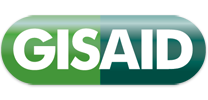Data on SARS-CoV-2 variants by Our World in Data
For more general information on our COVID-19 data, see our main README file in
/public/data.
Our data on SARS-CoV-2 sequencing and variants is sourced from GISAID, a global science initiative that provides open-access to genomic data of SARS-CoV-2. We recognize the work of the authors and laboratories responsible for producing this data and sharing it via the GISAID initiative.
Khare, S., et al (2021) GISAID’s Role in Pandemic Response. China CDC Weekly, 3(49): 1049-1051. doi: 10.46234/ccdcw2021.255 PMCID: 8668406
Elbe, S. and Buckland-Merrett, G. (2017) Data, disease and diplomacy: GISAID’s innovative contribution to global health. Global Challenges, 1:33-46. doi:10.1002/gch2.1018 PMCID: 31565258
Shu, Y. and McCauley, J. (2017) GISAID: from vision to reality. EuroSurveillance, 22(13) doi:10.2807/1560-7917.ES.2017.22.13.30494 PMCID: PMC5388101
We download aggregate-level data via CoVariants.org, and we make it available as a CSV file.
License
All visualizations, data, and code produced by Our World in Data are completely open access under the Creative Commons BY license. You have the permission to use, distribute, and reproduce these in any medium, provided the source and authors are credited.
The data produced by third parties and made available by Our World in Data is subject to the license terms from the original third-party authors. We will always indicate the original source of the data in our database, and you should always check the license of any such third-party data before use.
Fields
| Column field | Description |
|---|---|
location |
Name of the country (or region within a country). |
date |
Date of the observation. |
variant |
Variant name. We use the WHO label for Variants of Concern (VoC) and Variants of Interest (VoI), and Pango Lineage for the others. Details on variants included can be found here. |
num_sequences |
Number of sequenced samples that fall into the category variant. |
perc_sequences |
Percentage of the sequenced samples that fall into the category variant. |
num_sequences_total |
Total number of samples sequenced in the last two weeks. |
Special variant values
others: All variants/mutations other than the ones specified (i.e. not listed in this table).non_who: All variants/mutations without WHO label.
Note that non_who includes others and other variants. For instance, variant B.1.16 is counted in the non_who category but not in others, as it does not have a WHO label but is listed in this table.
As a consequence, for a given date, the sum of perc_sequences will exceed 1. In order to sum 1, you should exclude non_who category.
Example
| location | date | variant | num_sequences | perc_sequences | num_sequences_total |
|---|---|---|---|---|---|
| United Kingdom | 2021-03-08 | B.1.160 | 4.0 | 0.01 | 29598 |
| United Kingdom | 2021-03-08 | B.1.258 | 17.0 | 0.06 | 29598 |
| United Kingdom | 2021-03-08 | B.1.221 | 3.0 | 0.01 | 29598 |
| United Kingdom | 2021-03-08 | B.1.1.302 | 0.0 | 0.0 | 29598 |
| United Kingdom | 2021-03-08 | B.1.1.277 | 0.0 | 0.0 | 29598 |
| United Kingdom | 2021-03-08 | B.1.367 | 0.0 | 0.0 | 29598 |
| United Kingdom | 2021-03-08 | B.1.177 | 347.0 | 1.17 | 29598 |
| United Kingdom | 2021-03-08 | Beta | 60.0 | 0.2 | 29598 |
| United Kingdom | 2021-03-08 | Alpha | 28772.0 | 97.21 | 29598 |
| United Kingdom | 2021-03-08 | Gamma | 6.0 | 0.02 | 29598 |
| United Kingdom | 2021-03-08 | Delta | 0.0 | 0.0 | 29598 |
| United Kingdom | 2021-03-08 | Kappa | 12.0 | 0.04 | 29598 |
| United Kingdom | 2021-03-08 | Epsilon | 3.0 | 0.01 | 29598 |
| United Kingdom | 2021-03-08 | Eta | 97.0 | 0.33 | 29598 |
| United Kingdom | 2021-03-08 | Iota | 1.0 | 0.0 | 29598 |
| United Kingdom | 2021-03-08 | S:677H.Robin1 | 0.0 | 0.0 | 29598 |
| United Kingdom | 2021-03-08 | S:677P.Pelican | 0.0 | 0.0 | 29598 |
| United Kingdom | 2021-03-08 | others | 276.0 | 0.93 | 29598 |
| United Kingdom | 2021-03-08 | non_who | 647.0 | 2.19 | 29598 |
In this extract, we have that during the two weeks prior to 2021-03-08, in the UK, a total of 29598 samples were sequenced. From these, 28,772 correspond to Alpha variant and 647 are variants without WHO label.
